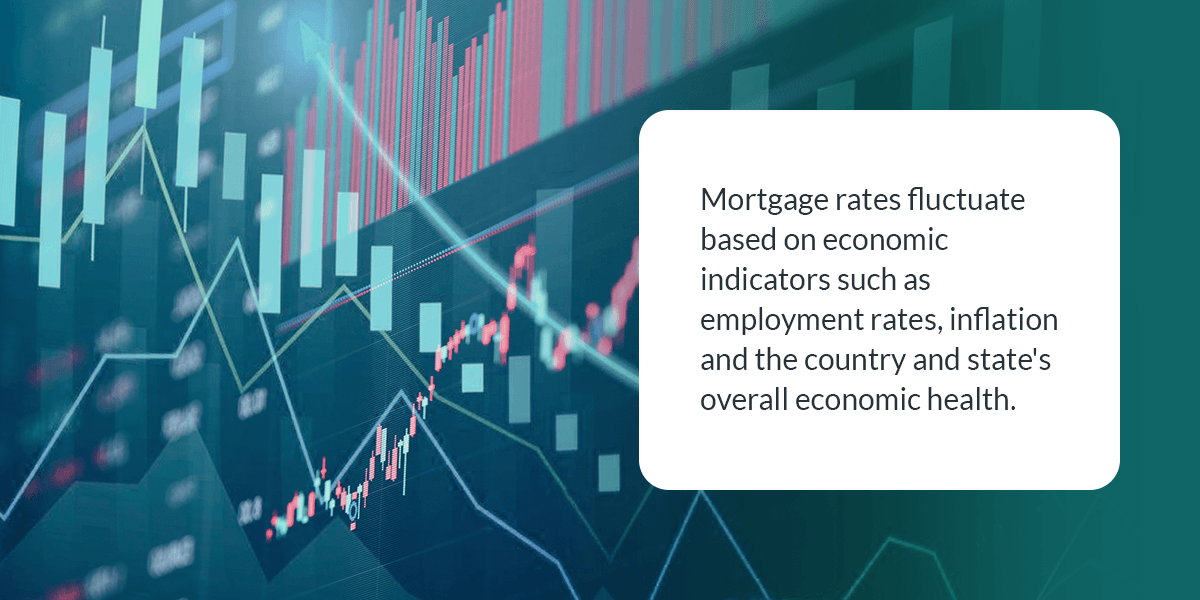Why are Mortgage Rates Different by Lender?
Understanding why mortgage rates vary by lender can help you select the right lender for your situation.
Do Lender Rates Vary?
If you've ever wondered why mortgage rates change daily, you're not alone! Mortgage rates change due to various factors, such as the specific lender, the location and even personal elements like your credit score. As you look for the best rate for your home, it's important to understand how factors such as the economy and overhead costs can affect rates so that you can make the best choice for your needs.
Are Mortgage Interest Rates the Same for All Lenders?
Mortgage rates vary by lender, as each lender has numerous costs they need to factor into their loans. They must also consider how the borrower's financial situation may affect their ability to pay back their loan. For example, a lender may look at your debt-to-income ratio and credit score before deciding on your mortgage rate. You need to find the right lender to find the best mortgage rate.
Why do Mortgage Rates Vary by Lender?
While national and world market forces determine interest rates, there are several reasons mortgage rates differ between lenders. Different lenders are willing to take different risk levels and can all have various costs to consider, such as closing overhead expenses.
Lender Overhead Costs
The lender’s overhead cost structure is a big factor in determining why mortgage rates differ by lender. Lenders who contain costs and keep their overhead low have the ability to offer better rates and/or closing costs. Overhead costs can include the following:
- Marketing cost
- Office space cost
- Cost of employee wages
- Cost of having poor risk management
- Insurance cost
Closing Costs
Closing costs are the fees you pay your real estate attorney and mortgage lender for their services. Closing costs are directly associated with the home interest rate being offered. A lender may have a lower rate that is disguised by a higher closing cost. This means that you are effectively paying for the lower rate and this may not be in your best interest.
Incomplete Information
Inaccurate rate quoting can make a lender’s rate appear lower than others and maybe even lower than the overall market. Lenders are usually within .25 percentage points of each other. If one lender’s rate stands out from all the others, it may be a misquote.
How Are Mortgage Rates Determined?
Some factors affecting your mortgage rate are under your control because rates vary based on financial situations. Your mortgage rate will partially depend on how risky the loan appears to lenders.
Lenders will review your financial history to determine the likeliness of you making payments on time, falling behind on payments or completely stopping paying on your loan. They will consider how much money they could lose if you fail to make payments.
Other factors affecting how mortgage interest rates are determined may be beyond your control. By understanding what affects your mortgage rate, you can choose a lender with a competitive interest rate.
How Are Mortgage Rates Determined?
Some factors affecting your mortgage rate are under your control because rates vary based on financial situations. Your mortgage rate will partially depend on how risky the loan appears to lenders.
Lenders will review your financial history to determine the likeliness of you making payments on time, falling behind on payments or completely stopping paying on your loan. They will consider how much money they could lose if you fail to make payments.
Factors You Can Control
Credit Score
Credit scores of 740 or higher will grant borrowers the lowest mortgage rates and the widest variety of loan product choices. Interest rates will be a little higher for borrowers with credit scores between 700 and 739, and they will be even higher for borrowers with a score that is 699 or lower. However, homebuyers with credit scores as low as 580 also have low down payment mortgage options.
Debt-to-Income Ratio
Your debt-to-income ratio compares your monthly pre-tax income to your owed debt, such as student loans, leases, car loans and credit cards. It's the percentage of the income you spend on monthly debt payments and your new home loan's projected payment.
Your lender will determine your debt-to-income ratio by combining your monthly debt payments with your projected mortgage payment and then dividing the total by your monthly income before tax.
Down Payment
Your down payment amount will also affect your mortgage rate because of the impact it has on your loan-to-value ratio. The smaller your down payment is, the larger your loan-to-value ratio will be. Similarly, the larger your down payment is, the smaller your loan-to-value ratio will be.
The loan-to-value ratio compares a mortgage amount to a home's value or price. For example, if you place a $30,000 down payment on a $120,000 home, the mortgage will be $90,000. Your loan-to-ratio value will be 75% because you are borrowing 75% of the house's value.
Lenders consider a loan-to-value ratio greater than 80% to be high – but not at Homesite Mortgage! We specialize in low down payment financing.
Loan Riskiness
A lender may also charge you more for financial actions like cash-out refinances, adjustable rate mortgages and loans for manufactured or second homes, as these loans are riskier for the lender.

Factors Beyond Your Control
Mortgages are generally subject to change due to market forces. Mortgage rates change daily based on economic indicators and predictions that are beyond your control as a homebuyer, such as:
Overall Economy
Mortgage rates tend to increase when predictions indicate fast economic growth, high inflation and low unemployment. Conversely, a mortgage rate may fall when the economy and inflation slows and unemployment rises.
Inflation
Increases in inflation can cause mortgage rates to rise because the dollar loses buying power as prices increase. As a result, lenders may request higher interest rates to compensate for this change in value.
For example, inflation skyrocketed in early 2022, causing mortgage rates to rise. As inflation decreased in 2023, mortgage rates saw a decline.
Job Growth
High unemployment rates can result in a recession, which can cause mortgage rates to drop. Periods of high job growth can cause mortgage rates to increase.
Federal Reserve
While the Federal Reserve doesn't set mortgage rates, it can determine whether they rise or fall. The Federal Reserve raises and reduces short-term interest rates in reaction to trends in the economy, which in turn causes mortgage rates to rise and fall. While mortgage rates and the Federal Reserve operate independently of one another, they typically move in the same direction.
How Does a Lender Determine Interest Rate?
A lender determines interest rates by looking at several factors and considering a loan's risk. Lenders consider their overhead costs, the borrowers' financial health, the economy and a home's overall value before determining an interest rate. Some factors — like the economy — are out of your control. However, you can control other factors, such as your credit score and debt-to-income ratio.
How to Improve Your Mortgage Rate
While some factors determining mortgage rates are out of your control, you can strive for the lowest interest rate by improving your financial health and choosing the right lender. Some methods you can use to boost your interest rate are:
- Improving your financial profile: The lowest mortgage rates are for borrowers with the best credit scores, making it important to grow your score as much as possible before applying. Some ways to improve your credit score include paying bills on time and paying down any debt to reduce how much credit you use.
- Making a larger down payment: A higher down payment can lower your loan-to-value ratio and reduce your overall mortgage rate.
- Using pay points: A pay point is a fee you pay to reduce the overall interest rate on your mortgage. Each point costs 1% of the loan amount, and the more you purchase, the more you will save each month.
- Using first-time homebuyer programs: As you explore different mortgages, consider if you qualify for any first-time homebuyer programs. Each state offers its own programs that can greatly reduce the cost of buying a home.
Find Low Mortgage Rates With Homesite Mortgage
Naturally, the best way to lower your interest rate is to apply for a loan with Homesite Mortgage to keep your overhead costs low and find the best rates possible. We offer homebuyers competitive rates and exceptional experience. We will inform you of all your options so you can get the best loan possible and benefit from lifetime savings.
Contact Homesite Mortgage to learn more about how we can help you buy a home with the best mortgage rate possible. Need to calculate your potential mortgage payment or tax deduction? Check out our thorough mortgage calculator and mortgage tax credit calculator!
Why choose Homesite Mortgage for your Home Finance?
Our licensed mortgage bankers are trained to offer intelligent mortgage advice!
Our interest rates and closing costs are low so that you’ll save more money!
Our state-of-the-art technology is designed to save you time and keep your personal information safe!
Our mortgage process is quick and easy – you’ll typically close your loan in just 18-20 business days!
Our company culture is truly consumer-focused and we guarantee your mortgage experience will be better than any other!

